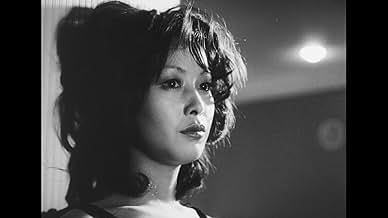IMDb-BEWERTUNG
6,2/10
1121
IHRE BEWERTUNG
Füge eine Handlung in deiner Sprache hinzuA revolutionary faction steals some hand bombs. While escaping, several soldiers are killed. The movement's highest authority deems October unfit and sends the leader of another faction to t... Alles lesenA revolutionary faction steals some hand bombs. While escaping, several soldiers are killed. The movement's highest authority deems October unfit and sends the leader of another faction to take the remaining bombs.A revolutionary faction steals some hand bombs. While escaping, several soldiers are killed. The movement's highest authority deems October unfit and sends the leader of another faction to take the remaining bombs.
Empfohlene Bewertungen
A bunch of young Japanese terrorists named after weekdays follow the orders of a terrorist named after a month: October. They steal some boxes of bombs from a US Army warehouse (the sign in the movie actually says: weapon wearhouse). They are found by two US soldiers. There's a shooting. A bomb explodes in October's face. He is blinded but alive. That is the opening scene of the movie, after that the plot is quite thin for the rest the "story".
The style of the movie is similar to Jean Luc Godard's early films but Koji Wakamatsu makes a film that has the actors reciting political slogans all throughout with random scenes of sex and violence. I am actually not sure if it was meant to be a serious film, but I actually found it quite funny and I enjoyed it as a Z grade pseudo philosophical porn terrorist comedy.
Ecstasy of the Angels is definitely not a great film but it was interesting and funny.
The style of the movie is similar to Jean Luc Godard's early films but Koji Wakamatsu makes a film that has the actors reciting political slogans all throughout with random scenes of sex and violence. I am actually not sure if it was meant to be a serious film, but I actually found it quite funny and I enjoyed it as a Z grade pseudo philosophical porn terrorist comedy.
Ecstasy of the Angels is definitely not a great film but it was interesting and funny.
As I write, no one on IMDb has provided a synopsis for Ecstasy of the Angels, and the few reviews here are rather bereft of plot details; could that be because no-one who has watched it has got a clue what was going on thanks to the stupefyingly dull direction, the coma-inducing performances, and the fact that it is virtually impossible to tell one character from another? I reckon so.
Before I gave up trying to follow the story and began praying for the film to just finish and thereby end my misery (I'm obsessive about watching a film in its entirety, no matter how bad), here's what I garnered about the plot: The Four Seasons revolutionary group is split into factions that go by the names of— surprise surprise—the Four Seasons. Fall organises a raid on a US army base and makes off with some high explosives (stored in what looks like Bilbo Baggins' hobbit hole), but with members of her team killed and injured during the job, the way is left wide open for the other factions to help themselves to the spoils of her venture. Cue much arguing amongst angry freedom fighter types, and lots of strangely unemotional sex scenes between the uniformly hot female members of the group and the seemingly unappreciative blokes.
If I had known what I was in for, I would have passed on this film, but for some reason I had got it into my mind that this was a sleazy Cat III effort from Hong Kong; not only did I get the country of origin wrong—this is a Japanese flick—but I also was also severely misguided when it came to the kind of film this was. Rather than a trashy piece of Asian filth, Ecstasy of the Angels is a pompous, pretentious, and extremely dull avant-garde art-house film that could only possibly appeal to the bearded chin-stroker contingent; whilst they might enjoy waxing lyrical about the intent of the piece, the film's political message or the pointless techniques employed by the director (B&W to colour to B&W to colour, ad nauseum), anyone else will simply be bored rigid. Hell, I was practically catatonic by the end of the film's opening scene in which several of the characters sit around a table in a night-club while a singer drones on endlessly in the background.
Before I gave up trying to follow the story and began praying for the film to just finish and thereby end my misery (I'm obsessive about watching a film in its entirety, no matter how bad), here's what I garnered about the plot: The Four Seasons revolutionary group is split into factions that go by the names of— surprise surprise—the Four Seasons. Fall organises a raid on a US army base and makes off with some high explosives (stored in what looks like Bilbo Baggins' hobbit hole), but with members of her team killed and injured during the job, the way is left wide open for the other factions to help themselves to the spoils of her venture. Cue much arguing amongst angry freedom fighter types, and lots of strangely unemotional sex scenes between the uniformly hot female members of the group and the seemingly unappreciative blokes.
If I had known what I was in for, I would have passed on this film, but for some reason I had got it into my mind that this was a sleazy Cat III effort from Hong Kong; not only did I get the country of origin wrong—this is a Japanese flick—but I also was also severely misguided when it came to the kind of film this was. Rather than a trashy piece of Asian filth, Ecstasy of the Angels is a pompous, pretentious, and extremely dull avant-garde art-house film that could only possibly appeal to the bearded chin-stroker contingent; whilst they might enjoy waxing lyrical about the intent of the piece, the film's political message or the pointless techniques employed by the director (B&W to colour to B&W to colour, ad nauseum), anyone else will simply be bored rigid. Hell, I was practically catatonic by the end of the film's opening scene in which several of the characters sit around a table in a night-club while a singer drones on endlessly in the background.
The film is a dated, incoherent, and pretentious rambling about fictional revolutionary, or rather quasi-revolutionary, terrorist group(s) in Tokyo in the sixties. Although there may be some resemblance to early Godard, Wakamatsu seems to be much less accomplished thinker, revolutionary, or craftsman than the French master of the New Wave. Notwithstanding the typically Asian overacting, all the persons in the "plot" act as detached mechanical puppets (perhaps intentionally?). They are not good in making either revolution or love. The frequent sex scenes were quite irritating not only because the participants recited quasi-political slogans, but also due to sometimes awkward choreography or cuts necessitated by the bizarre Japanese censorship law that does not allow a glimpse of pubic hair on the screen.
I wonder if the sign "WEAPON WEARHOUSE" on a weapon warehouse in the film is a joke for insiders or rather a testimony on the level of production values in this movie.
I wonder if the sign "WEAPON WEARHOUSE" on a weapon warehouse in the film is a joke for insiders or rather a testimony on the level of production values in this movie.
Koji Wakamatsu's "Ecstacy Of The Angels" runs for a mere eighty-nine minutes. After it ended it felt more like eight nine hours. Wakamatsu, known as the "Pink Godfather" (no, don't ask me why), was a pioneer of the pinku eiga genre. I had never heard the name Wakamatsu before. According to the blurb in the festival guide, "Ecstacy of The Angels" is a parable about a revolutionary organization torn apart by betrayal, its members descending into paranoia, sadism and sexual decadence. It sounded like a plot from an early Godard film, only from a Japanese perspective. This sounded interesting, I thought. It was about as interesting as having a tooth extracted. The opening sequence, in black and white, is set in a nightclub. A female singer screeches absurd lyrics, while at a nearby table three men and a woman sit in silence. Pretty soon though, I couldn't figure out which revolutionary faction was which, and by that time I was beyond caring. The actors don't just speak their lines, the bellow them at each other, as if they were all auditory challenged. In the frequent sex scenes (which are about as erotic as two storefront mannequins coupling), they go through the motions of sexual congress while mouthing absurd platitudes about fighting for the revolutionary cause. Frankly, Wakamatsu is definitely no match for Godard. Which reminds me, I need to visit my dentist for a check up. It'll be less painful all round.
This is an excellent film, flawed in the sense that certain aspects of the fictional revolutionary group appear quite caricatured at times but viewed in relation with director Koji Wakamatsu's newest film "United Red Army" it can be seen to draw a surprisingly accurate picture of the revolutionary nihilism of the Japanese student activists of the time. Other reviewers have compared the film to Godard's early work such as La Chinoise and admittedly the artistic style is quite similar though less refined, and far from being less politically aware than Godard, Wakamatsu was actually much more realistically cynical in his portrait of armed student activist cells whereas Godard's revolutionary themed films displayed a certain hopeful naiveté in the potential of a largely dogmatic and authoritarian movement which was strongly criticized by his contemporaries in the Situationist International. The writer of this film Masao Adachi was certainly not a pretentious intellectual out to exploit sex and revolutionary pop aesthetic as some critics have inferred here; a closer look at his personal history shows that shortly after writing the screenplay he actually moved to Lebanon to join the real life armed revolutionary group the Japanese Red Army where he remained a committed activist for 28 years up until his arrest in the year 2000. As such the film can be a unique and telling account of his own mentality and the personal motivations which led to joining the JRA, as well as his prior knowledge of the less-than-ideal dynamics of the lifestyle he would be choosing. One must keep in mind that at the time Wakamatsu was expected by producers to be making films in the 'pink' genre which would explain the gratuitous sex scenes that could be seen as offensive or pointless to some but the unique beauty of the film far outweigh it's occasional rough edges. Highly recommended, though not for casual viewers of film "for entertainment's sake" alone.
Wusstest du schon
- WissenswertesThis film was released in a time of violent social turmoil for Japan. ATG, the film's distributor, got cold feet when a rash of Christmas tree bombing, similar to the one in the movie, started to plague the streets of Tokyo. The film was quickly withdrawn from distribution and briefly re-released in the art theater circuit.
- PatzerWhile the revolutionaries enter the base, a sign reading "weapon wearhouse" instead of "weapon warehouse" is clearly visible for several seconds.
- VerbindungenEdited into Gli ultimi giorni dell'umanità (2022)
Top-Auswahl
Melde dich zum Bewerten an und greife auf die Watchlist für personalisierte Empfehlungen zu.
- How long is Ecstasy of the Angels?Powered by Alexa
Details
Box Office
- Weltweiter Bruttoertrag
- 585 $
- Laufzeit1 Stunde 29 Minuten
- Farbe
- Sound-Mix
- Seitenverhältnis
- 2.35 : 1
Zu dieser Seite beitragen
Bearbeitung vorschlagen oder fehlenden Inhalt hinzufügen

Oberste Lücke
By what name was Tenshi no kôkotsu (1972) officially released in Canada in English?
Antwort

















